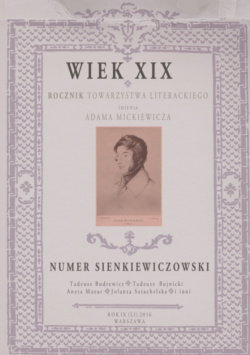Książę Michał Twerski. Rosyjski awatar Juliusza Słowackiego
Prince Michael of Tver: the Russian Avatar of Juliusz Słowacki
Author(s): Marek TroszyńskiSubject(s): Polish Literature
Published by: Towarzystwo Literackie im. Adama Mickiewicza
Keywords: history of Russia; Juliusz Słowacki; Polish drama; Veliki Novgorod
Summary/Abstract: In “Książe Michał Twerski” (“Prince Michael of Tver”), one of his final, unfinished plays, Juliusz Słowacki draws from the history of Medieval Russia. Aside from “Agezylausz” (“Agesilaus”), it is his only play not set in Poland. By setting it in Veliki Novgorod, a free and prosperous republic, brutally conquered by Ivan the Terrible, he recalls a trend in Russian tradition that has been condemned to oblivion. In face of the risky moves made by the Towiański’s circle, which were dubbed by him a “Russian lean”, Słowacki left the group, and in the draft of his play, which he signed as “A Republican of Spirit”, he reminded of the values that, although stamped out in Russia, were re-born in the Polish-Lithuanian Commonwealth. The play, which could have been a form of apotheosis of a section of Russia history, remained unfinished. The poet had instead focused on writing “Rozmowa z Matką Makryną Mieczysławską” (“The Interview of Mother Makryna Mieczysławska”), which was a description of barbaric practices of imperial Russia against Catholic nuns, although in this case the original sources were in fact a hoax.
Journal: Wiek XIX. Rocznik Towarzystwa Literackiego im. Adama Mickiewicza
- Issue Year: LI/2016
- Issue No: 1
- Page Range: 52-70
- Page Count: 20
- Language: Polish

